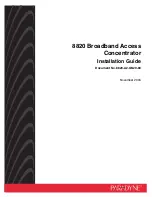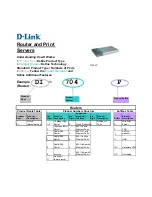
About the Radio | 35
Aprisa SRi User Manual 1.1.0
The Radio Network as a Gateway Router
The Aprisa SRi point-to-multipoint radio network can be considered as a gateway
router where the ‘network
Ethernet interface’ on each radio in the network is the ‘router port’.
The routing table for all directly attached devices to the Aprisa SRi network, at the Base or the Remote
radios is automatically built, and no static routes are required to be entered for those device routes.
The ‘Radio interface IP address’ is used internally for the radio network and automatic routes. It is not used
when setting static routes or default gateways.
Static route IP addresses or the default gateway should use the ‘network Ethernet interface’ IP address.
External network routers should be set with a high metric for the SRi path, to prevent route updates being
sent over the radio network.
The Radio Network as a Router
–
Example
The purpose of this example is to determine the static route setting for router R2 in the base station and
remote radio in the following network.
Since the Aprisa SRi network should be considered as a router where the network Ethernet interface is the
‘router port’,
the network configuration for setting the static routes or the default gateway IP addresses is
described in the follow figure:
Thus, the static route setting for router R2 at the Aprisa SRi base station and remote radio will be:
Destination Address
Destination Mask
Gateway Address
Static Route Setting at ?
192.168.3.0
255.255.255.0
192.168.2.1
Base station
192.168.3.0
255.255.255.0
192.168.2.2
Remote radio
Note:
The radio network (base station and remote radios) will automatically build routes to the attached
device e.g. SCADA Master station or attached router e.g. router R1 so static routes are not required for
these devices.
















































